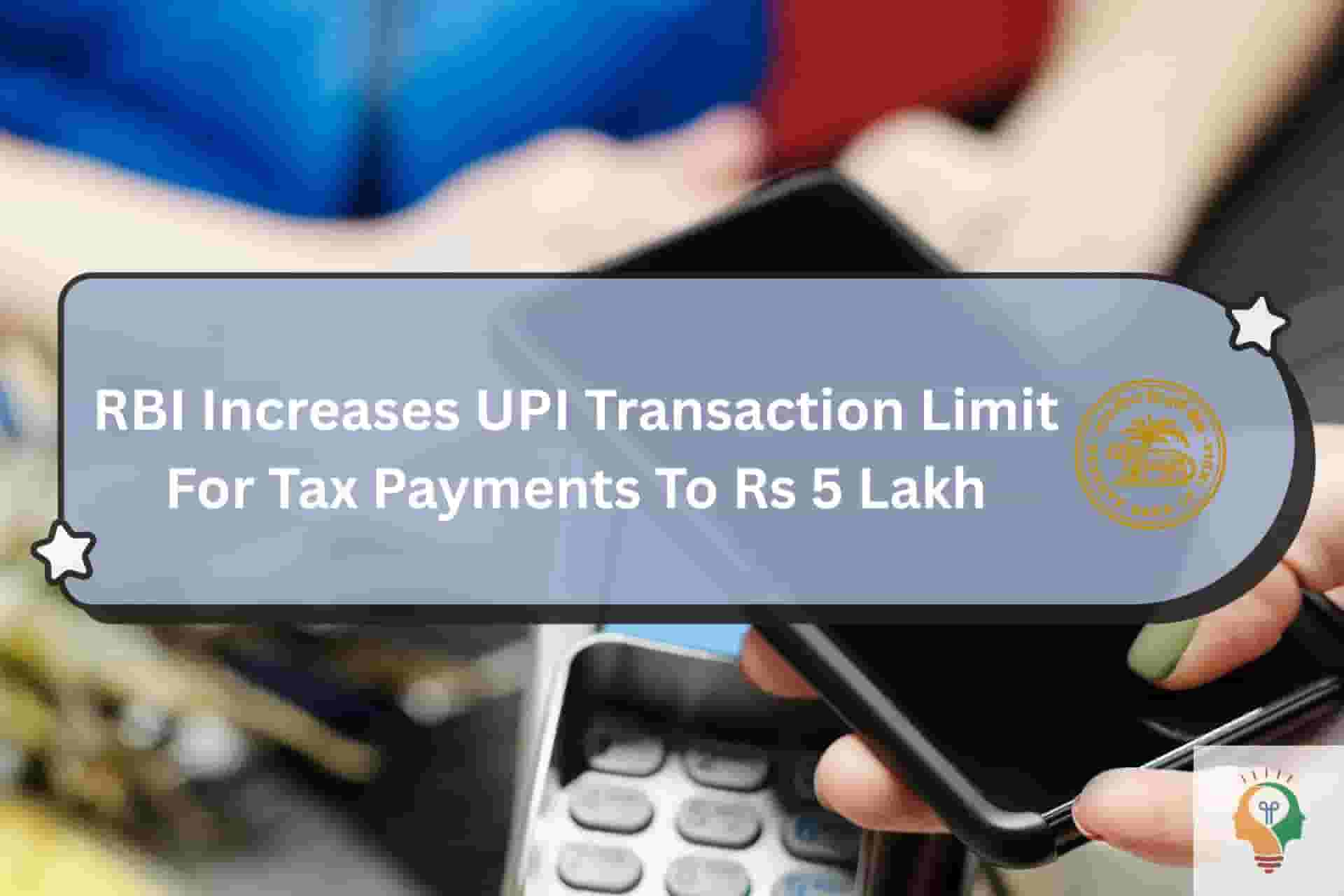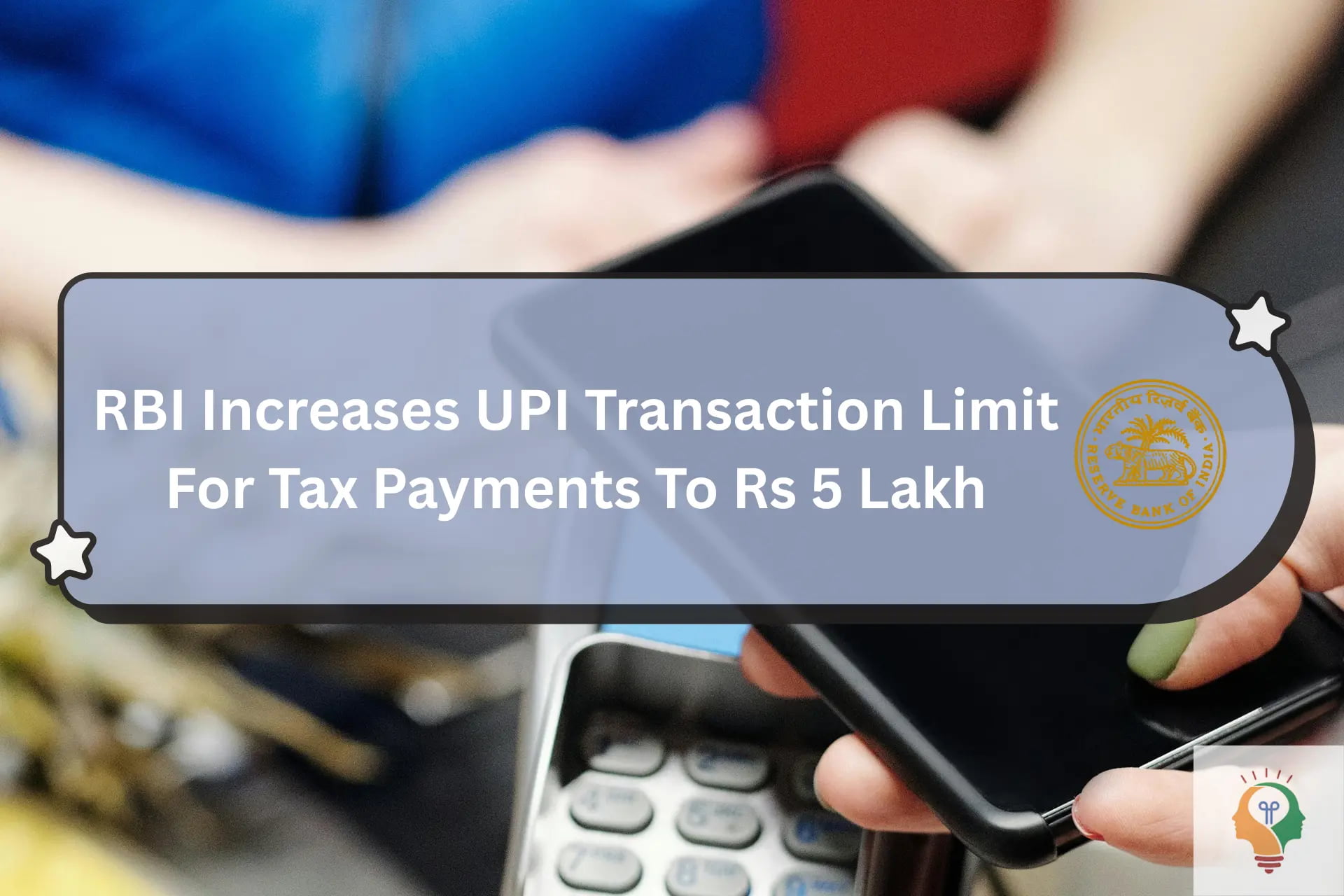RBI Increases UPI Transaction Limit For Tax Payments To Rs 5 Lakh
Updated: 14-01-2026 at 8:30 AM
1k


India’s digital payments ecosystem has witnessed another major leap forward. The Reserve Bank of India (RBI) has officially increased the Unified Payments Interface (UPI) transaction limit for tax payments from ₹1 lakh to ₹5 lakh. This landmark RBI UPI transaction limit update was announced on 8 August 2024 during the Monetary Policy Committee (MPC) meeting and has far-reaching implications for individuals, professionals, and businesses alike.
With UPI already dominating India’s digital payments landscape, the decision strengthens its role in digital tax payment India, especially for high-value transactions such as income tax, advance tax, self-assessment tax, and other government dues. The revised UPI tax payment limit RBI reflects growing confidence in the robustness, security, and scalability of the UPI framework developed by NPCI.
This article explains the new rule in detail, how it benefits taxpayers, how UPI tax payments work, and what this change means for the future of government tax collections.
Read More: Now You Can Pay Your Income Tax Using A Credit Card!
RBI’s New UPI Transaction Limit: What Has Changed?
The RBI has raised the ceiling for UPI-based tax payments from ₹1 lakh per transaction to ₹5 lakh per transaction. This change applies exclusively to tax payments made to government authorities and does not automatically extend to regular merchant or peer-to-peer UPI transactions.
Key Highlights of the Update
Before diving deeper, here is a quick snapshot of what the RBI UPI tax payment rule introduces:
| Particulars | Details |
|---|---|
| Previous UPI Limit for Tax Payments | ₹1 lakh |
| Revised UPI Limit | ₹5 lakh |
| Applicable From | August 2024 |
| Applicable To | Direct & indirect tax payments |
| Announced By | Reserve Bank of India |
| Implemented Via | NPCI & banks |
This new UPI limit for tax payments significantly reduces friction for taxpayers with large liabilities and supports smoother government collections.
How Does The New UPI Limit Benefits For Taxpayers?
The increase in transaction limits is not merely a technical update; it directly improves the taxpayer experience. Below is a clear breakdown of how this decision helps individuals and businesses.
Simplified High-Value Tax Payments
Paying taxes such as advance tax, self-assessment tax, or corporate tax often involves large amounts. Earlier, taxpayers had to split payments into multiple transactions due to the ₹1 lakh cap.
With the UPI payment limit for income tax now raised to ₹5 lakh, taxpayers can clear substantial dues in a single transaction. This reduces errors, saves time, and improves payment accuracy.
Cost-Effective Compared to Cards
UPI transactions generally attract zero or minimal charges, unlike credit cards, which may involve convenience fees or surcharges. For taxpayers, especially businesses, this makes government tax payment UPI a far more economical option.
Faster Settlement and Confirmation
UPI payments offer real-time settlement and instant confirmation. This is particularly useful during deadline-driven payments such as advance tax instalments or last-day income tax payments.
The updated RBI UPI transaction limit update ensures that speed and efficiency are not compromised even for high-value payments.
Understanding The UPI Payment Process For Tax Liabilities
To pay tax through UPI, you need a mobile number associated with your bank account, an active bank account and an app that supports UPI.
Once set up, income tax payment via UPI involves entering the amount, selecting UPI as the payment mode, and authorising the transaction using a UPI PIN.
It is much easier compared to using debit or credit cards, where all details, including card details, CVV code, date when it expires and most times a one-time password have always been required to make each purchase.
Furthermore, the UPI payment process for tax liabilities after the RBI's new limit is not only more streamlined, but it is also more convenient in terms of making payments that have higher transaction values.
Read More: Income Tax On Credit Card Transactions: Strategies To Avoid A Tax Notice
Impact Of UPI Limit Increase On High-Value Tax Transactions
There are several positive effects of increasing the transaction limit for tax payments using UPI to Rs 5 lakh:
-
Ease of Use: Chartered accountants, consultants, freelancers, and business owners often deal with sizeable tax liabilities. The higher UPI tax payment limit RBI allows them to manage payments efficiently without resorting to net banking or RTGS.
-
Cost-Effective: This makes UPI a cheaper option compared with debit and credit cards, as no extra charges are imposed on transactions made through it by taxpayers.
-
Security: Consequently, UPI transactions have an added layer of security due to multifactor authentication, which guarantees safe processing and transfers of funds. This reinforces trust in digital tax payment in India and strengthens UPI’s credibility as a secure platform.
-
Promotion of Digital Transactions: It further positions UPI as a prominent tool in the Indian digital economy, thereby persuading people to go for digital modes of payment.
The impact of the UPI limit increase on high-value tax transactions is particularly beneficial for professionals, businesses, and individuals with significant tax liabilities, as it allows for smoother, hassle-free transactions.
How To Set Up UPI for High-Value Transactions Like Tax Payments?
The following steps will help you prepare your UPI account for government tax payment UPI smoothly:
Step 1: Download a UPI-supported app. Choose from popular apps like Google Pay, PhonePe, or BHIM.
Step 2: Link your bank account. You should ensure that your mobile number is linked to your bank account and that it has been enabled for use with UPI.
Step 3: Generate a UPI ID. Proceed with the application’s instructions to form your own UPI ID and create a PIN that is safe enough.
Step 4: Verify your bank account. Confirm that your bank allows high-value UPI transactions as per the RBI UPI circular.
Step 5: Start making payments. Once you have completed setting up, it is easy for you to enter the amount of tax and end up paying using your UPI pin.
Completing these steps ensures you can fully utilise the new UPI limit for tax payments without interruptions.
Role of NPCI and Banks in Implementing the New Limit
The National Payments Corporation of India (NPCI), which operates UPI, plays a crucial role in implementing RBI directives. Following the announcement, NPCI issued system-level instructions to banks to support the revised limit.
This NPCI UPI update ensures that backend infrastructure, settlement mechanisms, and fraud monitoring systems are aligned with higher transaction values.
Banks, in turn, are responsible for updating internal systems, customer limits, and risk controls to comply with the RBI UPI tax payment rule.
Additional UPI Features And Announcements
Besides raising the upper limit on UPI-facilitated tax payments, the RBI has also introduced delegated UPI payments. The said feature will enable primary users to delegate payment authority to another individual (e.g., family members) by accessing their bank accounts. This is projected to boost flexibility and use of UPI across different demographics.
The RBI's initiative to increase the UPI transaction limit for tax payments to Rs 5 lakh and the introduction of delegated payments are part of a broader strategy to strengthen India’s digital payment infrastructure. These changes not only make UPI more accessible but also position it as a leading platform for secure and efficient financial transactions.
This move complements the RBI UPI transaction limit update by expanding UPI’s usability across demographics.
Read More: Income Below Exemption Limit? Check If You Need To File ITR
What Does This Mean for the Future of Digital Tax Payments?
The decision to raise the UPI limit reflects the RBI’s confidence in UPI’s ability to handle large-value transactions securely. As tax compliance increasingly shifts online, UPI is expected to become the preferred mode for routine and high-value government payments.
In the coming years, digital tax payment in India is likely to see:
-
Wider UPI acceptance across government portals
-
Integration with more state and local tax systems
-
Enhanced real-time reporting and reconciliation
The UPI payment limit for income tax could also pave the way for broader use cases beyond taxes.
Conclusion
The increase in the UPI transaction limit for tax payments to ₹5 lakh marks a major milestone in India’s digital finance journey. Through this RBI UPI circular, the central bank has made tax compliance simpler, faster, and more cost-effective for millions of taxpayers.
By enabling seamless income tax payment via UPI, reducing reliance on cards and net banking, and strengthening trust in digital systems, RBI has reinforced UPI’s position as a cornerstone of India’s financial infrastructure.
As adoption grows, government tax payment UPI will not only ease compliance but also contribute to transparency, efficiency, and financial inclusion. For taxpayers, this update is more than a convenience; it is a step towards a smarter, digitally empowered tax ecosystem.
Get the latest updates on government schemes and policies with Jaagruk Bharat. Join India's biggest Jaagruk Bharat community. Share your thoughts, questions, and favourite topics with us.
Frequently Asked Questions
0
0
1k
0
0
1k Views
0
No comments available





Our Company
Home
About
T&C
Privacy Policy
Eula
Disclaimer Policy
Code of Ethics
Contact Us
Careers
Cancellation & Refund Policy
Categories
Women
Insurance
Finance
Tax
Travel
Transport & Infrastructure
Food
Entertainment
Communication
Government ID Cards
E-commerce
Traffic guidelines
Miscellaneous
Housing and Sanitation
Sports
Startup
Environment and Safety
Education
Agriculture
Social cause
Employment
Disclaimer: Jaagruk Bharat is a private organization offering support for documentation and government scheme access. We are not affiliated with any government body. Official services are available on respective government portals. Our goal is to make processes easier and more accessible for citizens.
All Copyrights are reserved by Jaagruk Bharat